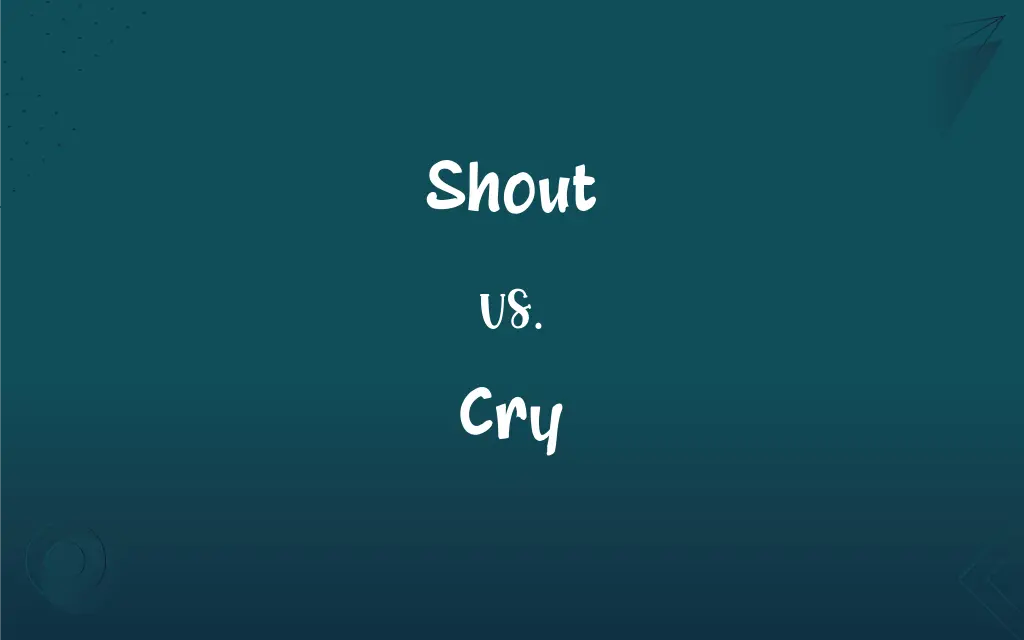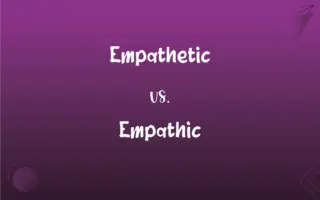Shout vs. Cry: What's the Difference?
Edited by Aimie Carlson || By Harlon Moss || Updated on November 3, 2023
Shout means to yell or raise one’s voice loudly; cry refers to shedding tears or calling out in distress.

Key Differences
Shouting is the act of raising one's voice to a loud volume, often to be heard over a distance or noise. Crying can involve tears due to emotions, or the act of calling out loudly, which overlaps with shouting but has an emotional connotation.
A shout is typically associated with strong emotions such as anger or excitement, or with the intention to be heard. To cry, on the other hand, implies an emotional response, such as sadness, joy, or need for help, or can denote a loud call.
Shouting can be a deliberate action to gain attention, alert someone, or express an urgent message. Crying is often involuntary, a natural response to overwhelming feelings, though it can also be used to describe shouting with a purpose, such as crying for help.
When someone shouts, the context is usually about the volume and the effort to be audible. In contrast, crying is more about expressing feelings or a state of being, even when used in the sense of crying out.
Shouting can happen in various situations ranging from arguments to celebrations. Crying, when not related to tears, often has a sense of urgency or desperation, like crying out in pain or alarm.
ADVERTISEMENT
Comparison Chart
Volume
Loud and forceful
Can be loud or soft, depending on context
Emotion
Often anger, excitement, or command
Usually sadness, joy, or pain
Intent
To be heard or convey a message
To express emotion or call for help
Physical Response
Involves vocal projection
Often involves tears
Usage Context
Can be aggressive or authoritative
Indicates distress or appeal
ADVERTISEMENT
Shout and Cry Definitions
Shout
Loud call for attention.
The coach’s shout could be heard across the field.
Cry
Wail in distress.
The baby would cry whenever he was hungry.
Shout
Vociferate to express.
They shout their support at every game.
Cry
To shed tears.
He couldn't help but cry during the sad movie.
Shout
Raise voice in anger.
She didn’t have to shout at the misbehaving child.
Cry
Lament emotionally.
They gathered to cry their loss together.
Shout
To yell loudly.
He had to shout to be heard over the wind.
Cry
Exclaim with passion.
The crowd would cry out in protest.
Shout
Bellow in excitement.
The fans began to shout when the singer took the stage.
Cry
Call out loudly.
Lost in the forest, she began to cry for help.
Shout
A loud cry.
Cry
To shed tears, especially as a result of strong emotion such as grief, sorrow, pain, or joy.
Shout
To say with or utter a shout.
Cry
To call loudly; shout.
FAQs
Can crying be silent?
Yes, crying can be without sound, as in weeping tears.
Is it correct to use ‘shout’ for whispering loudly?
No, shouting implies a much higher volume than whispering.
Do both shout and cry express urgency?
Yes, but cry often has a more desperate connotation.
What situations might prompt a cry?
Sadness, happiness, pain, or seeking attention.
Is it grammatically correct to say ‘shout for help’?
Yes, it means to call out loudly for assistance.
Is shouting always negative?
No, it can express positive excitement as well.
What does shouting involve?
It involves raising one’s voice loudly.
What emotions typically cause a shout?
Anger, fear, enthusiasm, or urgency.
Can shout and cry be used interchangeably?
Not usually, as they often imply different emotions and intents.
Are shout and cry synonymous when referring to vocal sounds?
They can overlap when someone calls out loudly but generally have different meanings.
In literature, how is crying often depicted?
As an emotional response, often with tears.
What synonyms can be used for shout?
Yell, holler, bellow, roar.
Does shouting necessarily mean speaking words?
Not always, it can be any loud vocal expression.
Is shouting a form of communication?
Yes, especially over distance or through noise.
Can ‘cry’ mean to announce or proclaim?
Yes, as in "cry one’s wares."
Are there health effects from shouting?
Prolonged shouting can strain the vocal cords.
What is the body’s response to crying?
It may involve tears, sobbing, and other physical signs of emotion.
How do I teach the difference between shout and cry to ESL students?
Teach "shout" for loud speech, "cry" for emotion or a loud plea.
Can cry be a noun as well as a verb?
Yes, it can be both.
Can animals cry in the same sense as humans?
Animals can make crying sounds, but they do not cry tears for emotional reasons like humans.
About Author
Written by
Harlon MossHarlon is a seasoned quality moderator and accomplished content writer for Difference Wiki. An alumnus of the prestigious University of California, he earned his degree in Computer Science. Leveraging his academic background, Harlon brings a meticulous and informed perspective to his work, ensuring content accuracy and excellence.
Edited by
Aimie CarlsonAimie Carlson, holding a master's degree in English literature, is a fervent English language enthusiast. She lends her writing talents to Difference Wiki, a prominent website that specializes in comparisons, offering readers insightful analyses that both captivate and inform.































































